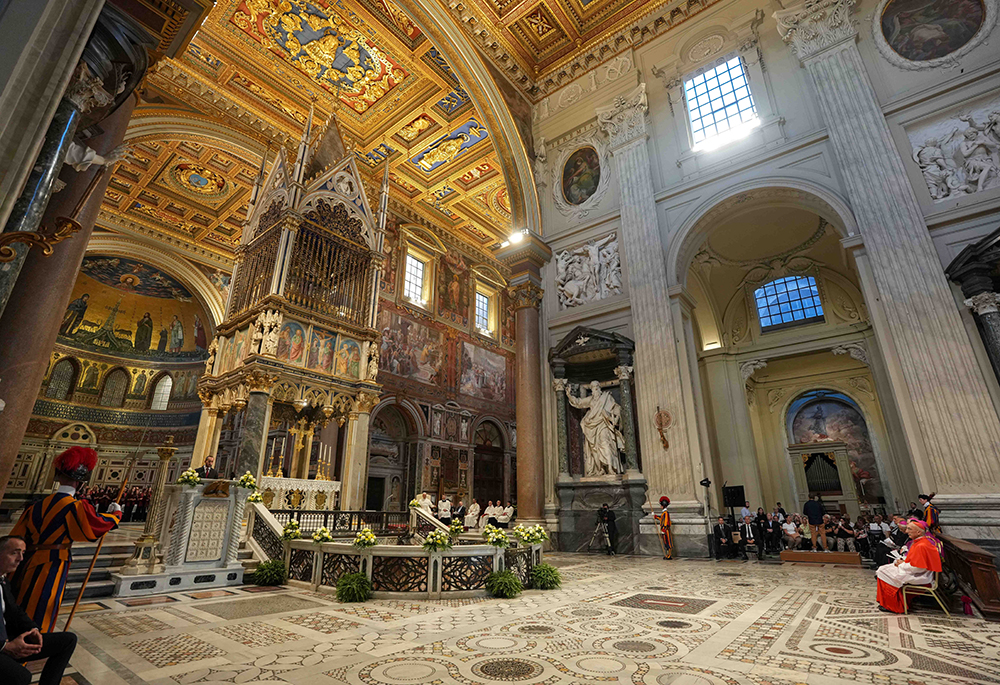
Pope Leo XIV presides over a prayer service at the Basilica of St. John Lateran in Rome to mark the beginning of a new pastoral year for the Diocese of Rome Sept. 19, 2025. (CNS/Lola Gomez)
On Nov. 9, the Catholic Church celebrates the feast of the Dedication of the Basilica of St. John Lateran, the parish church of the popes, considered the mother church of Catholicism. The basilica's history began around 318 or 324 C.E. and was alternately destroyed and rebuilt until 1724.
Although this is a major celebration in Rome, many of the faithful, especially in the Americas and Asia, might ask, "So what?" Maybe, rather than think of a cathedral that most of us will never enter, we might consider the meaning of our own experience of places of worship and what we experience as sacred space.
Not every space on Earth is the same, not for human beings. Our experiences and preferences lead us to favor certain places and avoid others. Places — with their smells, sounds, lighting and atmosphere — bring back memories, both joyful and not so. In some places we feel like strangers, in others, we're deeply at home and peaceful. Entering some spaces gives people a sense of the holy — just ask pilgrims who have been to Lourdes or to the Mormons' Sacred Grove in New York.
People of the Middle Ages built cathedrals to proclaim the greatness of Christianity's God. With towers pointing to heaven, their immense windows portrayed saints and sacred stories in brilliant light. The space inside tamed both city and forest into breathtaking order. The "smells and bells" transported people into a sense of transcendence. Mere humans could enter these places and feel both their insignificance and an awesome awareness of participating in something immeasurable.
Temples, be they Notre Dame Cathedral in Paris or the centuries-old log church in Cahokia, Illinois, provide the faithful with religious experiences that engage all the senses, put them in touch with the past and remind them of where all is going. It happens for those who have eyes to see, ears to hear, and hands to be touched and blessed.
In today's Liturgy of the Word, Ezekiel describes a fantastic, hopeful vision of a new temple for his exiled people. Every detail illustrated its vivifying power. As a dwelling place of God, all that flowed from it would nourish and cleanse such that even the water of the Dead Sea would become pure and refreshing.
If Ezekiel's vision inspired Jesus, he found little reflection of it in the Temple of his day. While the buying and selling were legitimate and necessary for worship, commerce seemed to have become an end in itself, eclipsing the experience of worship. In that, Jesus saw a living sacrilege undercutting the very purpose of that sacred space. His reaction sprang from his passion for leading others into a deep and mutual relationship with God and one another.
If John's Gospel had not been written decades after Paul's ministry, we could consider today's selection from 1 Corinthians as a commentary on Jesus' final statement about destroying and raising up the temple. People considered the Jerusalem Temple, like churches, synagogues and mosques, as a place of encounter with God. Paul wanted the Corinthians to realize that, like Jesus, they themselves were now to serve that purpose.
Advertisement
Paul asked them bluntly, "Do you not know that you are the temple of God, and that the Spirit of God dwells in you?" If he asked the same of us today, with what depth of conviction could we say yes? With what depth of sincerity could we say that we believe the Spirit of God is actively present in our community of faith? These are questions that might prove fruitful for those of us who are not celebrating today in Rome.
"The temple of God, which you are, is holy!" Contemporary English doesn't communicate the word "you" quite as precisely as some other languages. In Spanish, one can say you with tú, vosotros, usted and ustedes. The first two (singular and plural) are spoken among loving equals, the others are more respectful or formal. When Paul says, "You are the temple," he's using the plural you. That means that we are the temple, not each on our own, but as a community, as church, as the body of Christ. (See 1 Corinthians 12.)
What does this tell us? When Jesus spoke of "this temple," he implied that he himself incarnated the presence of God. That's generally not a problem for us to accept. But when we hear Paul tell us, "It's 'you,' " isn't this a call to collaborate? To discern together? To be concerned about our communal temple's upkeep?
Take a look at the basilica we're commemorating today, or picture the most magnificent church or space you know. It's overwhelming, majestic, beautiful, extraordinary.
It's a dim shadow of what the Spirit wants to make of us.







